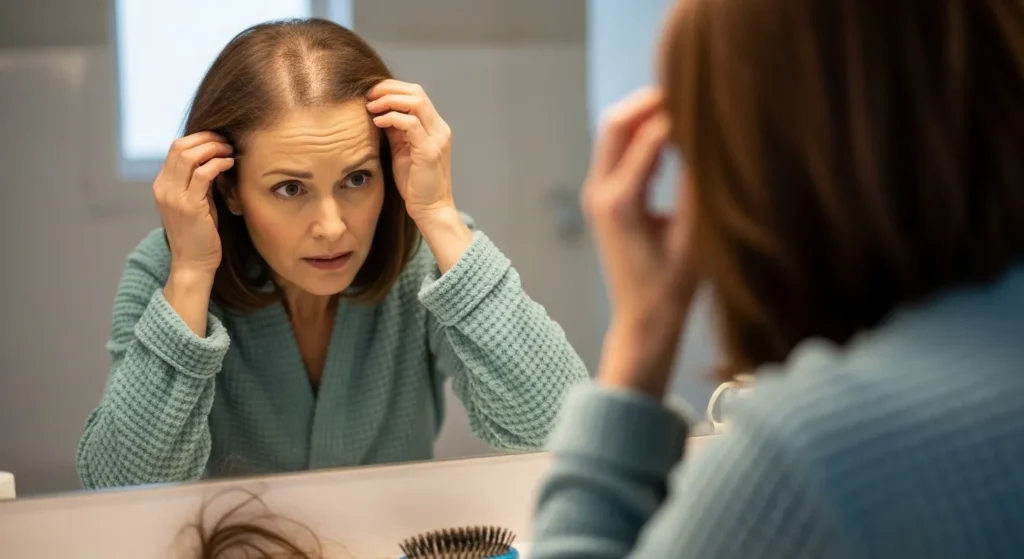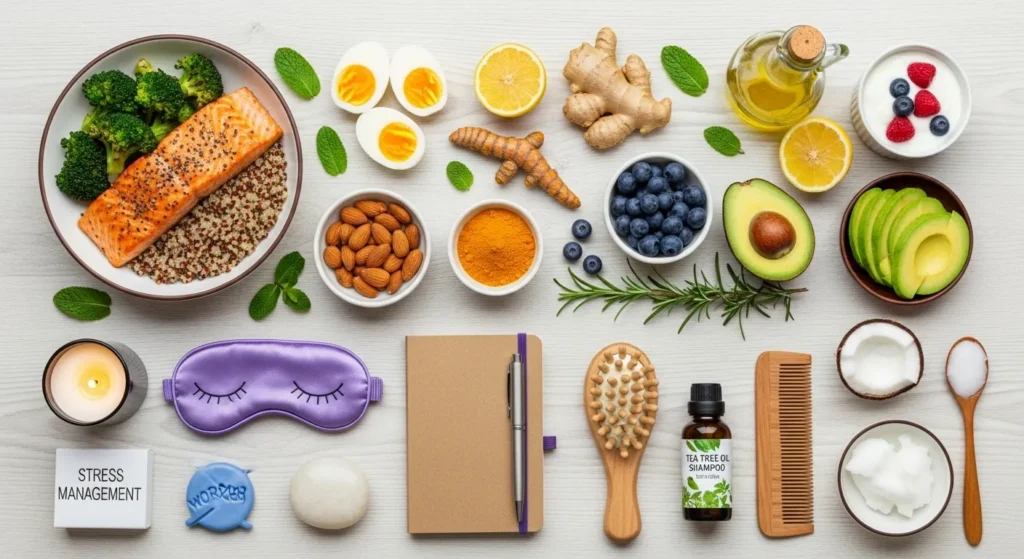Struggling with thinning hair as menopause begins? Menopause hair loss supplements are often marketed as the solution, but not all are proven to work.
In this guide, we’ll break down the supplements backed by clinical science, highlight safe natural options, and share expert strategies for managing hair loss during menopause.
This evidence-based article is designed to help you make informed, confident decisions about restoring hair health and regaining confidence.
Understanding Hair Loss During Menopause

What Causes Hair Thinning After Menopause?
Menopause triggers major hormonal changes. As estrogen and progesterone decline, their protective effect on hair follicles weakens. Meanwhile, androgens such as dihydrotestosterone (DHT) can become more dominant, shrinking follicles and shortening the hair growth cycle.
Other contributing factors include:
- Inflammation and oxidative stress damage follicles
- Nutritional deficiencies (iron, vitamin D, protein)
- Stress and poor sleep, both common in menopausal women
- Genetics, which influence how sensitive follicles are to hormonal shifts
How Common Is It?
Research suggests that up to 50% of women notice increased hair thinning after menopause. While some only experience mild shedding, others may see visible scalp exposure, particularly along the parting line and crown.
Overview of Menopause Hair Loss Supplements
Vitamins & Minerals with Evidence
Certain nutrients play a vital role in healthy hair growth, but supplementation should only correct documented deficiencies:
- Iron: Critical for oxygen delivery to follicles. Supplement only if iron deficiency anemia is confirmed, as excess iron can be harmful.
- Vitamin D: Supports follicle cycling. Deficiency is linked to hair loss.
- Zinc & Selenium: Important for scalp health but rarely deficient in well-balanced diets.
- Biotin: Widely marketed, but evidence for benefit is weak unless a deficiency exists. Over-supplementation can also interfere with lab results.
Expert Tip: Always request a simple blood test before starting supplements like iron or vitamin D.
Specialty Supplements for Menopausal Hair
Nutrafol Women’s Balance is among the most clinically tested products designed for menopause-related hair thinning.
- Evidence: A 6-month randomized controlled trial showed 100% of women improved hair growth and thickness, with continued results at 12 months.
- Composition: Biotin, marine collagen, vitamin D, ashwagandha (adaptogen), and saw palmetto (natural DHT blocker).
- Best for: Women with visible thinning linked to hormonal changes.
Other specialized options include:
- Viviscal – marine collagen plus silica, modest evidence for hair density.
- Nutrafol gummies – an alternative for those who dislike capsules.
Natural Agents & Alternatives
Some women prefer gentler, plant-based supplements:
- Collagen peptides – may support follicle structure and scalp skin health
- Omega-3 fatty acids – reduce inflammation and nourish follicles
- Pumpkin seed oil – studied for androgen-blocking properties
- Saw palmetto – a natural DHT inhibitor, included in many blends
- Adaptogens (ashwagandha, maca root) – help balance stress and hormone fluctuations
While results vary, these supplements can be effective adjuncts to lifestyle changes and medical treatments.
Emerging Ingredients & Future Trends
Research into menopause hair loss continues to grow:
- Caffeine extracts: Applied topically, may extend the hair growth (anagen) phase.
- Probico: An emerging blend of proanthocyanidin, biotin, and CoQ10, being studied for follicle stimulation.
Comparing Supplements — What to Consider
Evidence & Clinical Backing
Not all supplements are equal. For example:
- Nutrafol Women’s Balance: Backed by randomized controlled trials.
- Generic biotin: Popular but weak evidence unless deficiency exists.
- Iron/vitamin D: Effective only if labs show low levels.
Safety Considerations & Lab Interference
- Biotin: Can interfere with thyroid, hormone, and heart lab tests. Stop use at least 72 hours before testing.
- Iron: Avoid unnecessary supplementation—too much can cause liver strain and other complications.
- Drug interactions: Some herbs (e.g., saw palmetto) may interact with blood thinners or hormone therapy.
Personalized vs. General Formulations
Personalized supplement protocols often outperform one-size-fits-all products. Consider tailoring based on:
- Hormone levels (estrogen, progesterone, testosterone, thyroid)
- Vitamin/mineral deficiencies
- Scalp health and inflammation markers
How to Choose & Use Supplements Safely and Effectively
Step-by-Step Plan
- Get a medical baseline: Request labs for iron, vitamin D, thyroid, and hormones.
- Correct deficiencies first: Replenish low levels of iron, vitamin D, etc.
- Introduce clinically tested options: Nutrafol or Viviscal if hair loss is progressing.
- Add natural agents: Collagen, omega-3, or pumpkin seed oil under medical guidance.
- Track progress: Use monthly photos and note shedding changes.
- Reassess at 6 months: If no improvement, consult a dermatologist or trichologist.
Lifestyle & Holistic Support
Supplements are most effective when combined with:
- Protein-rich diet: Supports keratin production.
- Anti-inflammatory foods: Omega-3 fish, leafy greens, berries.
- Stress management: Yoga, meditation, or therapy.
- Scalp care: Gentle shampoos, regular massage, and avoiding harsh chemicals.

Frequently Asked Questions (FAQs)
What supplements are safe during menopause for hair loss?
Most women benefit from correcting deficiencies (iron, vitamin D) and using tested blends like Nutrafol. Always consult your doctor before starting.
How long until I see results from supplements?
Typically 3–6 months for reduced shedding, with visible density gains after 6–12 months.
Can biotin interfere with my blood tests?
Yes. Biotin can skew thyroid and hormone results. Stop supplementation 3 days before labs.
Should I take iron or vitamin D even if I’m not deficient?
No. These supplements are only helpful—and safe—if you are deficient. Otherwise, they may cause harm.
Next Steps
If you’re struggling with hair thinning during menopause, know that effective solutions exist beyond trial-and-error vitamins. The right combination of evidence-based supplements, medical testing, and holistic care can restore thickness and confidence.
👉 Book a consultation with Dr. Rana Irfan in Islamabad today to create a personalized menopause hair loss supplement plan tailored to your body’s needs.
